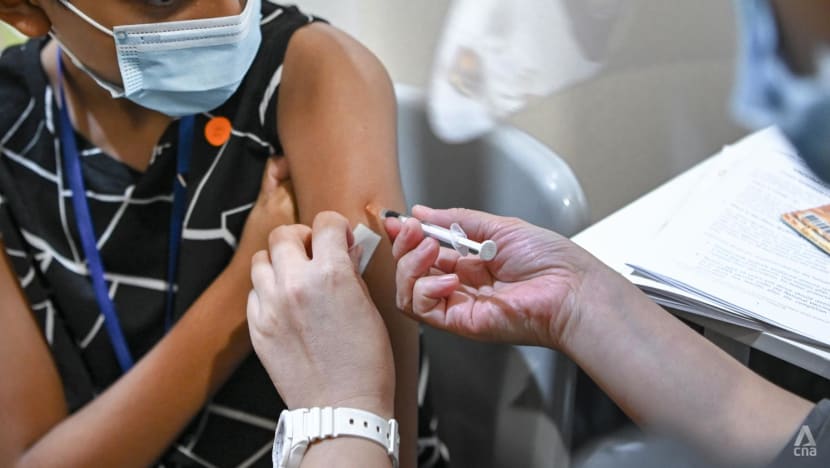Singapore maintains COVID-19 vaccination stance for children, adolescents as WHO revises recommendations
MOH said severe disease can still occur in children infected with COVID-19, including pneumonia, MIS-C (multisystem inflammatory syndrome in children), and even death.

A boy looking at the needle when taking his vaccination on Dec 27, 2021. (Photo: CNA/Hanidah Amin)
SINGAPORE: The Ministry of Health (MOH) is maintaining its COVID-19 vaccination stance for children and adolescents amid revised recommendations by the World Health Organization (WHO).
In its recent update, WHO had outlined three priority-use groups for COVID-19 vaccination, and considered healthy children and adolescents aged 6 months to 17 years to be low priority. It also suggested they may not necessarily need to get a COVID-19 shot.
However, it also urged countries to considering vaccination of this age group to base their decisions on "contextual factors".
In response to CNA's query, MOH said on Thursday (Mar 30): “By listing healthy children and adolescents aged 6 months to 17 years as a low priority group for COVID-19 vaccination, WHO is advising countries to base their decisions on their own context, including factors such as health priorities and costs."
MOH added that while local data shows that the risk of severe COVID-19 infection in younger children is generally low, unvaccinated children infected with COVID-19 had a higher risk of requiring hospitalisation compared to those who were previously vaccinated.
"Severe disease can still occur in children, including pneumonia, MIS-C (multisystem inflammatory syndrome in children), and even death," said MOH.
MOH added that WHO's recommendations in laying out priority groups for booster shots are consistent with Singapore’s prevailing approach.
"(Our approach) recommends that medically vulnerable persons receive a booster in 2023, one year after their last booster dose; and for persons aged five years and above to receive minimum protection," said MOH.
"Children aged six months to four years are recommended to complete two doses of Moderna/SpikeVax or three doses of Pfizer-BioNTech/Comirnaty.
"WHO has also maintained that primary and booster doses are safe and effective in children and adolescents."
In a news release on Tuesday, WHO said it revised the roadmap for prioritising the use of COVID-19 vaccines to reflect the impact of Omicron and high population-level immunity.
It outlined three priority-use groups for COVID-19 vaccination – high, medium and low – based on risk of severe disease and death. It also considered factors such as vaccine performance and cost-effectiveness.
WHO defined high-risk populations as older adults, as well as younger people with other significant risk factors. For this group, the agency recommends an additional shot of the vaccine either six or 12 months after the latest dose, based on factors such as age and immunocompromising conditions.
For those at medium risk, WHO recommends primary vaccinations and first booster doses but does not recommend routine additional boosters. This group includes children and adolescents with health risks and healthy adults below 60 years old.
Related:
On the low priority group, WHO said: "Considering the low burden of disease, (the Strategic Advisory Group of Experts on Immunization) urges countries considering vaccination of this age group to base their decisions on contextual factors, such as the disease burden, cost effectiveness, and other health or programmatic priorities and opportunity costs.
"The public health impact of vaccinating healthy children and adolescents is comparatively much lower than the established benefits of traditional essential vaccines for children – such as the rotavirus, measles, and pneumococcal conjugate vaccines – and of COVID-19 vaccines for high and medium priority groups."
MOH said that it, along with the Expert Committee on COVID-19 Vaccination, will continue to monitor the COVID-19 situation and developments in vaccines, and where relevant, update its vaccination recommendations.
You may also be interested in:
BOOKMARK THIS: Our comprehensive coverage of the COVID-19 pandemic and its developments
Download our app or subscribe to our Telegram channel for the latest updates on the coronavirus pandemic: https://cna.asia/telegram
















